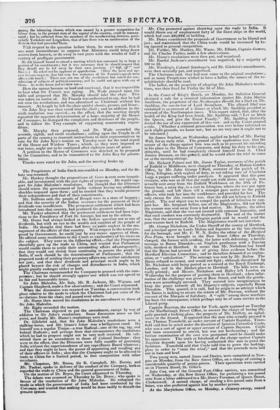'The Proprietors of India Stock reassembled on Monday, and the
de- bate was resumed.
Mr. Hankey thought the propositions of Gove: nent were inequit- able, and inconsistent with the just lights of property. He would sup- port Sir John Malcolm's resolutions. He thought that the Directors should retain the government of India without having any additional shackles imposed upon them ; and he trusted that they would preserve their independence and that of their constituents.
Mr. Sullivan said, the people of Bengal were in a state of beggary.; and that the security of the Indian revenues for the payment of their dividends was insufficient. The permanent settlement which had been introduced into that country, had produced the greatest misery.
Mr. Tucker admitted that the permanent settlement had been inju- rious to the Presidency of Fort St. George, but not to the others.
Mr. Hume had always looked at the Indian question not as one of dividends, but with an eye to the- wealth and comfort of the people of India. He thought that there had been culpable neglect in ma- nagement of the affairs of that country. With respect to the terms pro- posed by Government, he could :not by any means approve of them. He offered some resolutions to the Court as explanatory of his views on the subject. They were to the following effect,—that the Proprietors cheerfully gave up the trade to China, and trusted that Parliament would enable them to settle their outstanding affairs advantageously ; that they would not shrink from continuing to govern the people of India, if such should be the determination of Parliament ; that the proposed mode of settling their pecuniary affairs was neither satisfactory nor just ; and that their dividends and principal stock ought to be placed beyond the risk of changes and disturbances in India, which might greatly endanger either or both.
The Chairman recommended the Company to proceed with the com- promise; but he should strongly oppose one which was not agreed to on fair and honourable terms.
Sir John Malcolm, Mr. Sale, Mr. R.: Jackson, Mr. Wigram, and Captain Shepherd, made a few observations; and the Court adjourned.'
When the discussion was resumed on Tuesday, a conversation-took place relative to the mode in which the Chairman had put some of the resolutions from the chair, and passed over others.
Mr. Hume then moved his resolutions as an amendment to those of -Sir John Malcolm. • • Mr. Rigby seconded the motion. . The Chairman objected to put-the amendment, except by way of addition to Sir John's resolutions. Some discussion arose on this point, and finally Mr. Hume's resoltitious were read.
Dr.. Gilchrist said, that Sir John Malcolm's resolutions were a stalking-horse, and Mr. Grant's letter was a belligerent steed. He himself was a regular Trojan—a true Radical—one of the rag, tag, and bobtail Radicals ; and perhaps from that circumstance the resolutions which he had to propose might not be 'very well received. He sub- mitted them as an amendment to those of Colonel Stanhope : they were to the effect, that the Directors were fully capable of governing India without the superintendence of any superfluous Board whatever ; and that they ought to have the power of appointing and recalling any of their officers in India ; also.that.the Company ought to be allowed to trade to China for a limited period, in free competition with other meichants.
Mm Chapthan, Mr. Reece, Sir R. Campbell, Mr. Burnie, and Mr. Tucker, spoke in defence of the conduct of the Company, both as regarded the trade to China and the general government of India. On-the motion of Dr. Bryce, the Court adjourned to Thursday.
The debate was resumed on Thursday by Dr. Bryce; who spoke in - favour of the resolution of Sir John Malcolm. He eulogized the modein which the government of India had been conducted by the Company, and trusted that nothing would be done rashly to disturb the. present system.
Mr. Clay protested against throwing open the trade fet India. It would throw out of employment forty of the finest ships in the world, which had cost .500,0001. in building.
Mr. Deans considered the proposals of Government to be Liberal and just; and maintained that the China trade would he increased by be- ing opened to general competition. • Mr. Fielder, Mr. Hankey, Mr. Warre, Mr. Elliott, Captain Gowass, and Sir Charles Forbes, made a few observations.
Mr. Hurne's resolutions were then put, and negatived; Mr. Randal Jackson's amendment was negatived, by a majority of 100 to 32. • Mr. Weeding's, Colonel Stanhope's, and Dr. Gilchrist's amendments, were then severally put, and negatived. The Chairman said, they had now come to the original resolutions ; and as many Proprietors wished to have a ballot, the names of the re- quisitionists should be read.
The ballot, on the propriety of adopting Sir John Malcolm's resolu- tions, was then fixed for Friday the 3d of May.






















 Previous page
Previous page